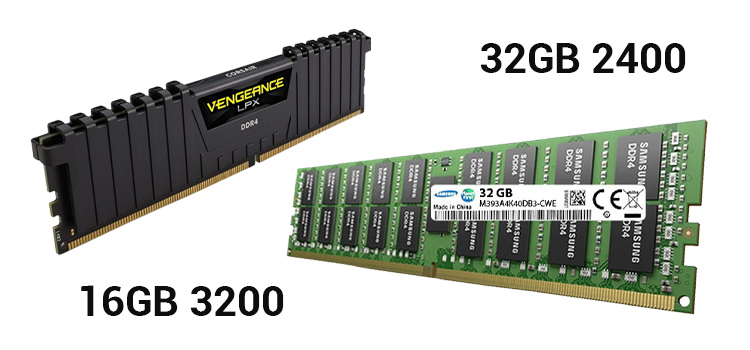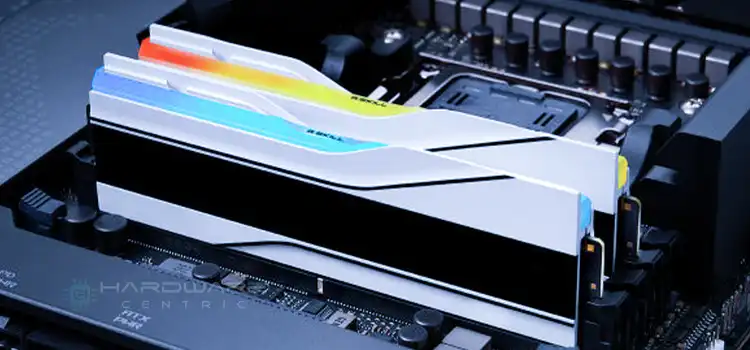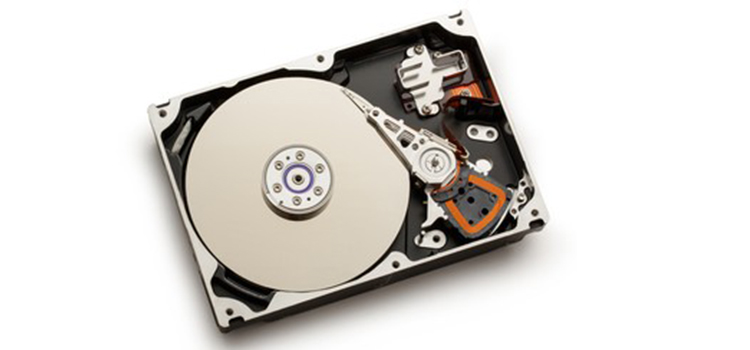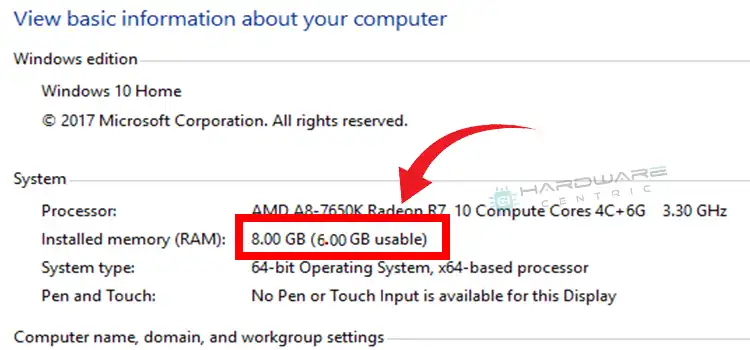HDD Speed 5400 RPM Vs 7200 RPM Gaming (Comparison Between Them)
HDD’s speed is determined by rotations per minute or RPM. The principle is rather simple, really. The faster a disk spins, the speedier it is. So naturally a 7200 RPM will fetch your data from its memory faster than a 5400 RPM HDD would. But the real question is how much and does it make any real-world improvement.
The answer is yes, it would, especially when we are talking about gaming. So, even though 5400 RPM is good enough for regular everyday use, while gaming, 7200 RPM will bring significant improvements to the table.
Continue reading below to find a more detailed comparison between a 5400 RPM vs. a 7200 RPM while gaming.
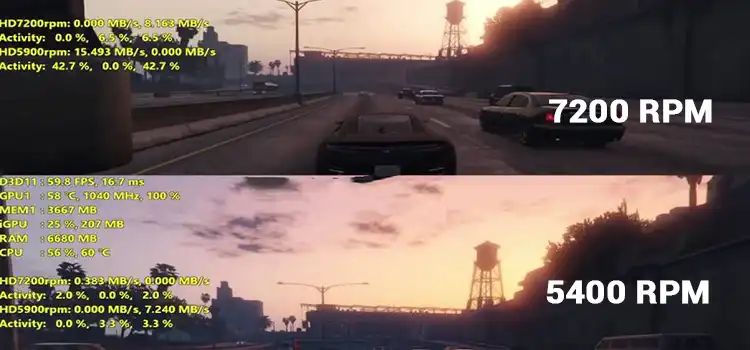
5400 RPM Vs 7200 RPM HDD Speed for Gaming
The first commercial HDD was made by IBM more than 50 years ago. Since then, the physical footprint of traditional HDDs is getting smaller and the internals, are speedier.
So, we’ve already established that higher RPM HDDs are definitely better for gaming. So why do they still make the slower ones? Well, it’s because they have their own advantage too. Let’s take a look at the difference chart below.
| Factor | 5400 RPM Hard Drive | 7200 RPM Hard Drive |
|---|---|---|
| Performance | Slower data transfer rates and access times | Faster data transfer rates and access times |
| Speed | Lower rotational speed (5400 RPM) | Higher rotational speed (7200 RPM) |
| Reliability | Generally reliable, suitable for regular desktop usage | Generally reliable, suitable for demanding applications |
| Price | Typically cheaper | Generally more expensive |
| Heating | Generates less heat due to slower rotation speed | Generates more heat due to higher rotation speed |
| Power Consumption | Lower power consumption | Higher power consumption |
| Noise | Generally quieter due to slower rotation speed | Slightly louder due to a higher rotation speed |
| Lifespan | Significantly higher | Lower |
As you can see, the speed doesn’t come without its caveats. Another thing to consider is that the actual speed difference doesn’t only rely on your HDD’s RPM, but a whole lot of factors. So, with a slower CPU and old-gen RAM, you won’t see that much of a performance improvement by upgrading to a 7200 RPM hard drive.
Real-Life Performance Difference Between 5400 & 7200 RPM HDD
If you translate all those RPM data into an understandable number, a 5400 RPM will give you a file transfer speed of around 100 Mb/s. The 7200 RPM ones, on the other hand, can reach a speed of up to 120 Mb/s. So, there’s a clear 20 percent performance improvement. However, you’ll only see that translate to real-life situations when you are copying larger files.
What about gaming then? Well, not all games need as much storage speed as you’d expect. In fact, unless you are playing titles like Battlefield, ARK, or any other open-world game with an enormous map, a 20 percent speed bump is so minuscule that you’ll barely notice it.
Yes, you’ll see a 10-15% improvement in loading time, but that’s it. That too if your current hardware allows for gaming in 4k.
5400 RPM Vs. 7200 RPM SSHD Gaming
However, if you are talking about SSHDs (Solid State Hybrid Drives), this argument is fairly irrelevant. Why so? Because, even though most of us think of SSHDs as HDDs with a slight bit of SSDs, in reality, they are significantly different from what you’d think. So, the 5400 RPM vs 7200 RPM argument is irrelevant here.
SSHDs use NAND flash drives, which don’t have to spin like traditional HDDs. Also, they use SSD circuitry, which makes locating and fetching data blazing fast. However, when data needs to be called from the HDD part of the SSHD, then you’d see a little bottleneck in terms of speed.
So, if you are thinking of getting an SSHD, 5400 RPM should be good enough. However, for gaming, given the SSD prices are already cheap enough, we recommend getting a smaller SSD and combine with a regular 7200 RPM HDD.
Our Verdict
Yes, 7200 RPM is always better for gaming than 5400 RPM HDDs. However, given a significant price drop as well as lower SSD and SSHD prices these days. We recommend you get an SSD or at least an SSHD.
However, if you are hell-bent on getting an HDD for gaming, which we don’t recommend at all, get the 7200 RPM one, only if you can game at 4k resolution. Anything below, you are better off with a 5400 RPM.
FAQs (Frequently Asked Questions and Answers)
Does 5400 vs 7200 RPM make a difference?
Yes, they do. In terms of performance, you should see a 33 percent gain. Also, you get roughly a 20 percent speed bump. However, that only applies when you are copying gigabytes’ worth of files at a time.
Does the RPM of a hard drive matter for gaming?
Yes, the RPM of hard drives does matter for gaming. A higher RPM is always better for gaming.
Is a 5400 RPM hard drive good for gaming?
Yes, 5400 RPM is good enough for gaming with anything below 4k.
Is 5400 more reliable than 7200?
Yes, in terms of reliability and lifespan or longevity, a 5400 RPM hard drive is more reliable than a 7200 RPM hard drive.
Final Thoughts
At the risk of repeating ourselves, we must say again, save up the money and get a 5400 RPM hard drive. Use the rest for an SSD for your OS and other essential programs. Only opt for the higher speed 7200 RPM HDD when your hardware is capable enough and you want to enjoy games at 4k resolution. Otherwise, it’s an overkill and a waste of money.
Hope we helped make up your mind. Thanks for stopping by.
Subscribe to our newsletter
& plug into
the world of PC Hardwares
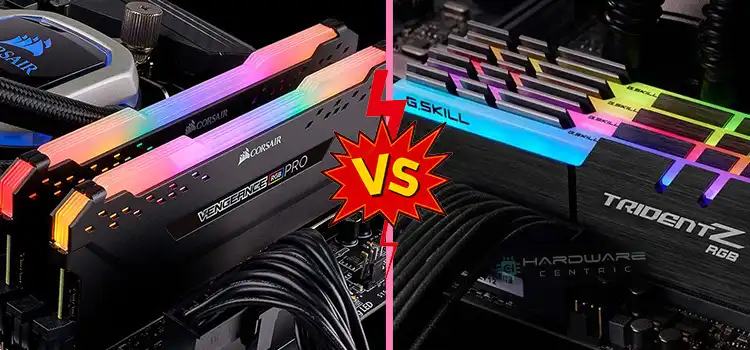
![[Explained] Do I Need 64GB RAM?](https://www.hardwarecentric.com/wp-content/uploads/2023/08/Do-I-Need-64GB-RAM.jpg)
